Iba-no-saka-kudashi Matsuri Festival 伊庭の坂下し祭
|
Title   • File Name • File Name   • Date • Date   • Position • Position   |
|
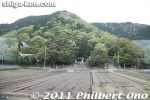
Held on May 4 by Sanposan Shrine in Higashi-Omi, Shiga Prefecture, Iba-no-saka-kudashi Matsuri has three portable shrines hauled down a steep mountain (Kinugasa-yama) for about 500 meters.
|
|
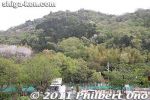
View of the bottom torii of Sanposan Shrine (繖峰三神社) on Kinugasa-yama (繖山) 432 meters high. (As seen from the train on the JR Tokaido Line. This torii is 15-min. walk from JR Notogawa Station. 繖峰三神社)
|
|
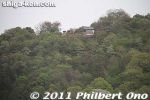
Part of Sanposan Shrine can be seen atop on Kinugasa-yama. The festival is related to the Junishi Chinese zodiac. They sing about the dragon going up the mountain and slithering down as a snake.
|
|
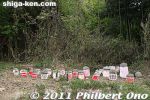
Some Jizo statues along the way to Sanposan Shrine from Notogawa Station.
|
|
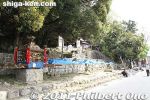
They carry the three mikoshi portable shrines up to Sanposan Shrine atop the mountain on May 3, the day before the festival on May 4. The god's spirit is then transferred to the mikoshi. One mikoshi is already on the ground.
|
|
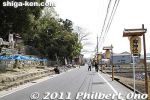
Area around the bottom torii of Sanposan Shrine. Map
|
|
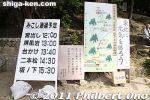
Rough timetable of the three portable shrines being hauled down the steep mountain. There are several points of interest (rough spots which are all named) and the approximate times when they will pass by.
|
|

Those rough spots can be exceptionally steep or difficult to pass for the men carrying the mikoshi portable shrine down the mountain. It's only 500 meters, but very steep and rocky.
|
|
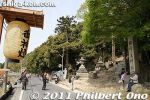
People start to gather near the bottom torii, a point called Sakashita (Slope Bottom). 坂下
|
|
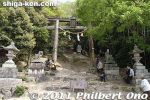
The torii is right on the bottom of the steep and rocky mountain slope.
|
|
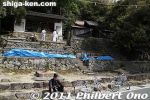
A few shrine buildings near the bottom torii.
|
|

About the Ibanosaka-kudashi Matsuri.
|
|
|
|

It makes you wonder how they can carry a heavy mikoshi down such a steep and rough slope.
|
|
|
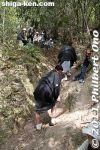
If you want to climb up the slope to see the mikoshi at higher-up rough spots, you have to climb up.
|
|

Quite a few people climbed up, and they seemed to be locals who have been climbing up the mountain a number of times even with young kids in hand.
|
|
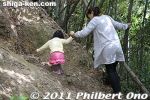
The kids are not afraid at all of the steep slope. The secret is to travel light. I was too bogged down with camera equipment and decided to stay near the bottom torii which tends to get most crowded.
|
|
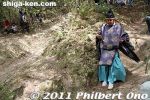
A shrine priest in full dress climbs down to my amazement.
|
|
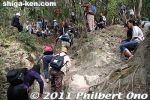
As the first mikoshi's scheduled arrival time nears, more people gather and climb the slope.
|
|
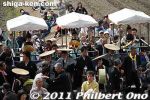
Three costumed boys wait right beyond the torii.
|
|
|
|

My YouTube video of the Iba-no-saka-kudashi Matsuri.
|
|
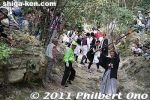
The first mikoshi called Sannomiya finally arrives near the bottom.
|
|
|
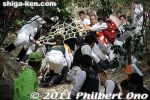
The Sannomiya mikoshi passes in front of us as they dragged it down the rocky slope. People do get hurt. I saw one guy who had hurt his foot, but was able to walk back down the mountain while accompanied by a fireman.
|
|
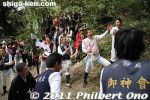
They sing a song as they drag the mikoshi. It's a contsant stop-and-go process.
|
|
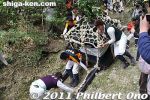
The second mikoshi, called Hachioji, passes through. 八王子
|
|
|
|
|
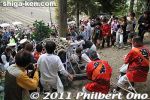
Two people behind the mikoshi hold ropes attached to the mikoshi.
|
|
|
|
|

The second mikoshi, called Hachioji, passes through. 八王子
|
|
|
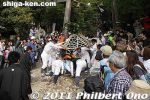
The third mikoshi, called Ninomiya, passes through the torii. 二の宮
|
|
|
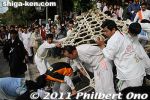
The second mikoshi Hachioji hits the pavement.
|
|
|

The third and red mikoshi Ninomiya passes through the torii. 二の宮
|
|
|
|
|
|
|
|
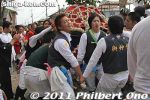
After hitting the paved road, they carry the mikoshi to a place nearby.
|
|
|
|
|

All three mikoshi are placed near the torii,
|
|
|
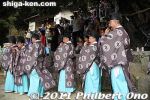
Shrine musicians play as the mikoshi arrive.
|
|
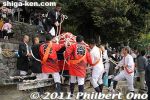
They undo the ropes covering the mikoshi.
|
|
|
|

They put the ornaments back on.
|
|
|
|

The three mikoshi are being readied for their next destination at another shrine nearby.
|
|
|
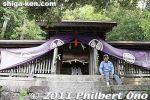
Sanposan Shrine near the bottom torii.
|
|
|
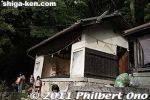
Looks like the mikoshi storehouse.
|
|
|
|
|
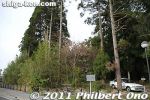
Near the Sanposan Shrine is the site of the Iba Goten Palace.
|
|

The Iba Goten Palace was a rest house for shoguns traveling between Tokyo and Kyoto during the early Tokugawa Period. 伊庭御殿遺跡
|
|

The palace seems to have had a large spread. The palace is known to have been designed by Kobori Enshu, a famous artist from Shiga. The place is now used as a park.
|
|
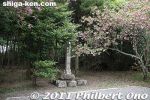
Small monument at Iba Goten.
|
|
|
|
|

About the Iba Goten Palace. 伊庭御殿遺跡
|
|
|
|
|